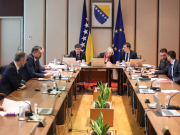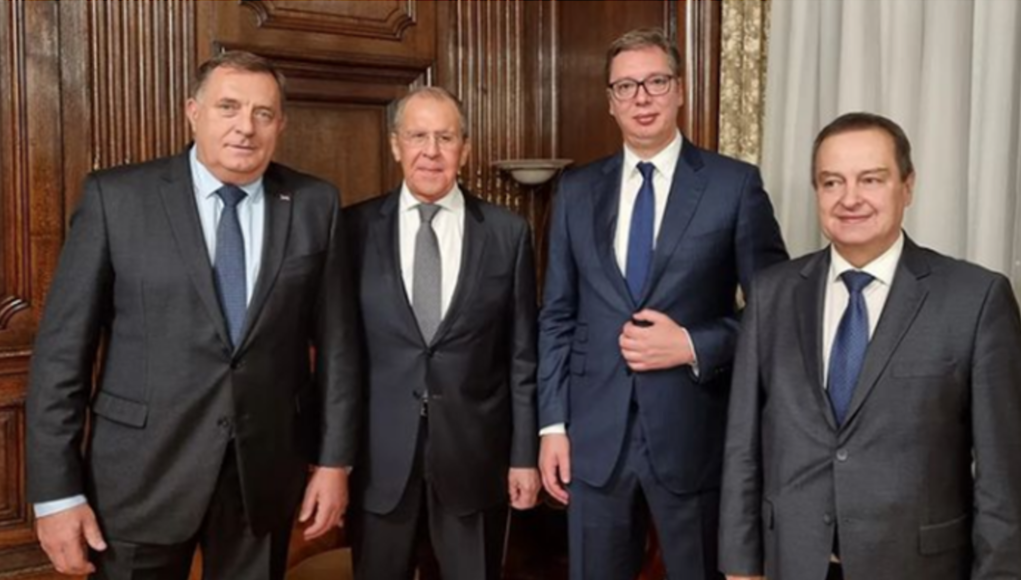Even while facing a major military defeat in Ukraine, Moscow continues to disrupt and destabilize vulnerable European regions, particularly the Western Balkans. It works through allies and partners who either have territorial pretensions to neighboring states, are deeply corrupted by Russian money and resources, or uphold old comrade networks with Russia’s officials.
Most European states have nationalist, ultra-leftist, and populist groupings who receive Russian cash or view Moscow as a valuable anti-democratic, anti-liberal, and anti-American bastion. However, only a few countries are governed by such parties or presidents. In the broader Balkan region, three states now have openly pro-Russian leaders – Serbia, Hungary, and half of Bosnia-Herzegovina – while two others – Montenegro and Bulgaria – are pressured by Moscow to follow suit.
Serbia remains the fulcrum of Russian penetration in the Balkans and is a constant headache for European institutions. Moscow views President Aleksandr Vučić as Russia’s disrupter-in-chief against the West. The pursuit of the “Serbian world” agenda helps to undermine the independence of Balkan states that seek closer ties with the US and Western institutions. Serbia is deeply penetrated by Russian services and Vučić knows that he would be quickly abandoned and even ousted by the Kremlin if he were to recognize Kosova, disown Serbian separatist objectives in Bosnia-Herzegovina, fully recognize Montenegro’s statehood, and petition for Serbia’s NATO membership. In effect, Vučić’s fear of Putin ensures Belgrade’s subordination to Kremlin strategy. Claims of Serbia’s “balancing” between West and East are primarily designed to extract concessions from Washington and Brussels in order to weaken Bosnia-Herzegovina, Kosova, and Montenegro.
Russia’s state interests are served in Bosnia-Herzegovina through ethno-nationalist divisions generated by the Republika Srpskaand Croatian nationalist leaders. Although Moscow seeks to corrupt a wide array of politicians and businessmen in the region regardless of ethnicity, Milorad Dodik has proved to be their primary success story. His ambitions and dependence on Russia for political support, diplomatic posturing, and corrupt funding ensures that he can be manipulated. The secession of the RS from Bosnia will likely be triggered when Putin needs a major regional crisis or even another Balkan war that can also embroil his allies in Belgrade and Budapest and divide the Western response. Ultimately, Dodik is useful to the Kremlin as a provocateur and saboteur.
The Hungarian government adds an additional lever for Moscow in promoting the pan-Serbian agenda and is also a valuable source of friction within the EU. Prime Minister Viktor Orbán faithfully served Putin by blocking Sweden’s NATO accession, delaying Finland’s NATO entry, and obstructing Ukraine’s participation in high-level NATO meetings. Budapest also recently signed energy deals with Gazprom and is contracted with Russia to build a nuclear power station. Orbán has also backed Dodik’s moves toward secession and openly favored Vučić’s regional program by signing agreements to boost military and defense industry cooperation with Serbia.
Hungary receives sizeable EU funds even while it undermines Western interests vis-à-vis an aggressive Russia and is ranked by Transparency International as the most corrupt state in the EU. The US has recently sanctioned officials of the Russian-controlled International Investment Bank in Budapest, viewing it as a platform for economic intelligence gathering. If a mechanism existed to expel Hungary from both NATO and the EU, it would be broadly supported throughout Europe.
Montenegro continues to be viewed in the Kremlin as a ripe target for anti-Westernism through the election of proxy governments under Belgrade’s influence. The recent presidential elections and the June parliamentary ballot provide opportunities to overturn Montenegro’s Western course and allow significant scope for Serbianization. Any foreign policy reversals in Montenegro will be especially welcomed in Moscow, as revenge against Podgorica for thwarting a coup attempt in October 2016 and as a demonstration that even NATO members are vulnerable to Russia’s subversion.
Bulgaria’s instability is also promoted by Moscow to keep the government in Sofia off balance, generate disputes with North Macedonia, and diminish NATO’s effectiveness in the Black Sea region. The primary Russian asset is President Rumen Radev, whose close personal connections with Moscow ensure his resistance to providing military assistance to Ukraine. He has also persistently called for lifting sanctions against Russia for its invasion of Ukraine, opposes a more effective NATO presence in the Black Sea to deter Moscow’s expansionism, and courts nationalist politicians who seek to undermine the statehood of North Macedonia.
A series of inconclusive elections in Bulgaria in recent years guarantee that no administration can function with a clear pro-Western line. Moscow has traditionally viewed Bulgaria as its loyal Balkan proxy but has been resisted by pro-Western parties and politicians. Over the centuries, Russia has posed as Bulgaria’s protector against Turkish imperialism while appropriating Bulgaria’s religious heritage and alphabet as its own. For Russian elites both Serbs and Bulgarians are inferior siblings who should loyally follow Moscow’s lead.
Russia’s increasingly blatant anti-Westernism, evident in its most recent foreign policy doctrine, provides justification for promoting Balkan conflicts to undermine Europe’s cohesion. The Balkans will remain a battleground even as Russia loses its grip over Ukraine and the unwieldy federation starts to fracture. Indeed, the peninsula may become the last outpost of Russophilia even as Moscow loses allies and influence in the South Caucasus and Central Asia.
Washington and Brussels need a tougher approach if they want the Balkans to be incorporated in a secure trans-Atlantic world. The current governments in Serbia and Hungary that follow Moscow’s lead cannot be converted into model democrats and anti-imperialists. Western appeasement simply fuels their ambitions and determination to remain in power. An effective policy must focus above all on strengthening the integrity and sovereignty of Bosnia-Herzegovina, Montenegro, and Kosova, while curtailing Belgrade’s nefarious regional influences. Otherwise, the US and EU will simply continue playing Moscow’s dangerous games and will wonder why the crisis has again blown up in their faces.
Janusz Bugajski is a Senior Fellow at the Jamestown Foundation in Washington DC. His recent book is Failed State: A Guide to Russia’s Rupture. His next book is titled Pivotal Poland: Europe’s Rising Strategic Player.
































